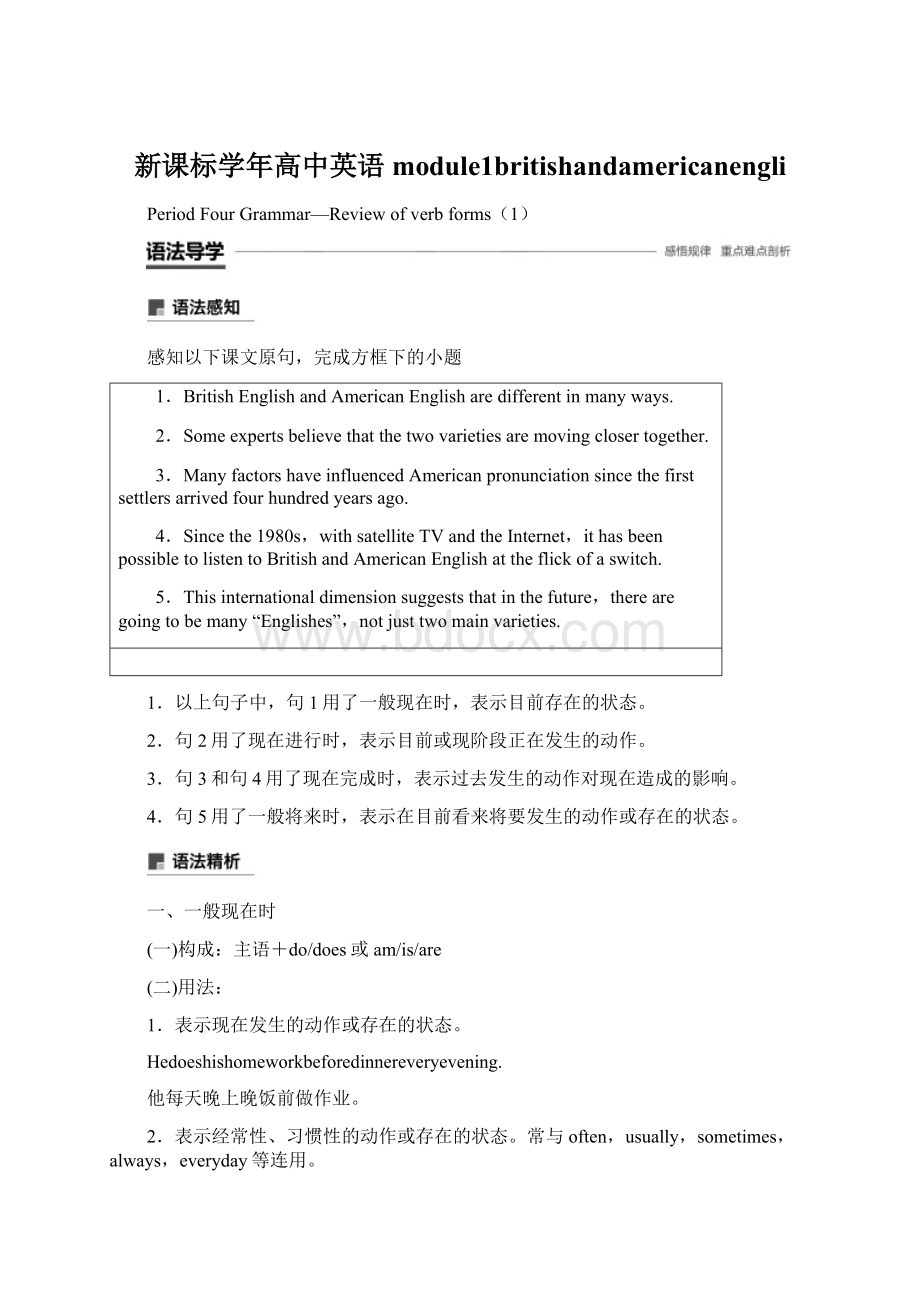新课标学年高中英语module1britishandamericanengli.docx
《新课标学年高中英语module1britishandamericanengli.docx》由会员分享,可在线阅读,更多相关《新课标学年高中英语module1britishandamericanengli.docx(15页珍藏版)》请在冰豆网上搜索。

新课标学年高中英语module1britishandamericanengli
PeriodFourGrammar—Reviewofverbforms
(1)
感知以下课文原句,完成方框下的小题
1.BritishEnglishandAmericanEnglisharedifferentinmanyways.
2.Someexpertsbelievethatthetwovarietiesaremovingclosertogether.
3.ManyfactorshaveinfluencedAmericanpronunciationsincethefirstsettlersarrivedfourhundredyearsago.
4.Sincethe1980s,withsatelliteTVandtheInternet,ithasbeenpossibletolistentoBritishandAmericanEnglishattheflickofaswitch.
5.Thisinternationaldimensionsuggeststhatinthefuture,therearegoingtobemany“Englishes”,notjusttwomainvarieties.
1.以上句子中,句1用了一般现在时,表示目前存在的状态。
2.句2用了现在进行时,表示目前或现阶段正在发生的动作。
3.句3和句4用了现在完成时,表示过去发生的动作对现在造成的影响。
4.句5用了一般将来时,表示在目前看来将要发生的动作或存在的状态。
一、一般现在时
(一)构成:
主语+do/does或am/is/are
(二)用法:
1.表示现在发生的动作或存在的状态。
Hedoeshishomeworkbeforedinnereveryevening.
他每天晚上晚饭前做作业。
2.表示经常性、习惯性的动作或存在的状态。
常与often,usually,sometimes,always,everyday等连用。
Shealwaysgoestherewithherparents.
她总是和父母一起去那儿。
3.表示普遍真理或客观存在的事实。
Theearthturnsroundthesun.
地球绕着太阳转。
4.表示计划、安排好的将来动作。
常用于表示位置转移的动词,如:
go,come,arrive,leave,start,begin等。
ThetrainforHankouleavesat8:
00inthemorning.
开往汉口的列车早上8点发车。
5.在时间或条件状语从句中,用一般现在时代替一般将来时。
PleaseringmeupassoonasyouarriveinGermany.
请你一到德国就给我打电话。
6.表示(书、信、报纸、通知、牌示、广播等)“说/报道”,用一般现在时,常用动词say。
Theradiosaysthattherewillbeaheavyrainintheafternoon.广播预报下午有大雨。
7.叙述历史或在小说、戏剧中,常用一般现在时,以使其生动。
Jeanneissittinginthepark.Matildawalkstowardsher;shestopsandspeakstoJeanne.
珍妮正坐在公园里。
玛蒂尔达走向她,停下来和她说话。
二、现在进行时
(一)构成:
主语+be(am,is,are)+doing
(二)用法:
1.表示说话时正在进行或发生的动作。
Listen!
Someoneisplayingthepiano.
听!
有人在弹钢琴。
2.表示现阶段正在进行而说话时不一定进行的动作。
WearestudyingSpanishthissemester.
这学期我们在学西班牙语。
3.表示将要发生的动作,一般跟时间状语,表明动作发生的时间。
常用arrive,begin,come,go,leave,start,stay,stop等非延续性动词。
SheisleavingforLondontomorrow.
她明天要去伦敦。
4.现在进行时可与always,forever,continually,constantly等副词连用,表示反复出现的或习惯性的动作,含有抱怨、赞叹、厌倦等感情色彩。
Heisalwaysaskingthesamequestion.
他老是问同一个问题。
三、现在完成时
(一)构成:
主语+have/has+done
(二)用法:
1.表示过去发生或完成的某一动作对现在造成的影响或结果。
Ihavejustcleanedmyclothes.我刚洗过衣服。
2.表示开始于过去、持续到现在的动作或状态,并可能继续下去(也可能不继续下去)。
Shehastaughtintheschoolfortenyears.
她在这所学校教书已经10年了。
Ihaven’teatenanythingsincebreakfast.
我从早饭起就一直没有吃东西。
3.表示从过去某一时间到说话时反复发生的动作或多次动作的总和,常同频度副词always,often,seldom,never等连用。
Hehasdonealotofworkinthepasttwoyears.
在过去两年中他做了许多工作。
IhavelearnedabouttwohundredEnglishwordsthismonth.这个月我学了大约200个英语单词。
4.Itis/hasbeen+一段时间+since从句
Itis/hasbeenabout5dayssinceshelefthere.
她离开这里大约5天了。
Itis/hasbeen3yearssincehelivedhere.
他不在这里生活已经三年了。
5.This/Itisthefirst/second/...timethat+现在完成时
ThisisthefirsttimethatIhavebeenhere.
这是我第一次来这里。
6.现在完成时和一般过去时的区别
现在完成时和一般过去时都表示在过去完成的动作。
但现在完成时强调的是这一动作与现在的关系,如对现在产生的结果或影响等;而一般过去时只表示动作在过去某一时刻发生,不表示和现在的关系。
试比较:
Ihavelostmynewbook.
我把新书丢了。
(现在还未找到)
Ilostmynewbookyesterday.
我昨天把新书丢了。
(昨天丢的,现在找到与否没说明)
四、一般将来时
(一)构成:
主语+
(二)用法:
一般将来时表示在现在看来即将要发生的动作或存在的状态。
1.shall/will+动词原形。
表示即将发生的动作或存在的状态。
特别是表示客观性的事情或在某条件下临时决定去做的事情,只能用此结构。
Whatshallwedoifhedoesn’tcome?
如果他不来,我们该怎么办?
2.begoingto+动词原形。
表示说话者主观打算做某事,或客观迹象表明即将发生某事。
Theyaregoingtomovetoanewhousenextweek.
他们打算下周迁入新居。
It’sgoingtorainsoon.
很快就要下雨了。
3.beto+动词原形。
表示按计划或正式安排将要做的事情,还可表示吩咐、命令、禁止、可能性等。
Whoistocleantheclassroomtoday?
今天该谁打扫教室了?
4.beaboutto+动词原形。
表示就要做或正好要做的事情。
往往暗含一种时间上的巧合,因此,一般不能与具体的时间状语连用。
Bequiet.Theconcertisabouttostart.
安静下来,音乐会就要开始了。
5.be+现在分词。
表示即将发生的动作或存在的状态。
这个句型中主要用瞬间动词:
come,go,leave,arrive,begin,start,stop,close,die等。
Goahead,andIamcoming.你先走,我就来。
单句语法填空
1.Whilerunningregularlycan’tmakeyouliveforever,thereviewsaysitis(be)moreeffectiveatlengtheninglifethanwalking,cyclingorswimming.(2018·全国Ⅰ)
2.Since2011,thecountryhasgrown(grow)morecornthanrice.(2018·全国Ⅱ)
3.China’shighspeedrailwayshavegrown(grow)from9,000to25,000kilometersinthepastfewyears.(2018·北京)
4.Hopefullyin2025wewillnolongerbeemailingeachother,forwewillhavedeveloped(develop)moreconvenientelectroniccommunicationtoolsbythen.(2018·江苏)
5.MydadthinksIshouldtaketheoffernow.Butatthemoment,schoolcomes(come)first.
(2017·全国Ⅲ)
6.Leavingthelessimportantthingsuntiltomorrowis(be)oftenacceptable.(2016·全国Ⅱ)
7.—Hi,let’sgoskating.
—Sorry,I’mbusyrightnow.Iamfilling(fill)inanapplicationformforanewjob.(2014·北京)
Ⅰ.单句语法填空
1.Asyougothroughthisbook,youwillfind(find)thateachofthemillionsofpeoplewholivedthroughWorldWarⅡhadadifferentexperience.
2.Inthelastfewyears,Chinahasmade(make)greatachievementsinenvironmentalprotection.
3.—Dr.Jacksonisnotinhisofficeatthemoment.
—Allright.Iwillcall(call)himlater.
4.MrMarkisregarded(regard)asoneofthemostimportantthinkersinthe21stcentury.
5.Ihaveread(read)halfoftheEnglishnovel,andI’lltrytofinishitattheweekend.
6.Ifmybrothercomes(come)backfromBeijingtomorrow,Iwillaskhimtocallyouback.
7.—Ihearyouareworking(work)inapub.What’sitlike?
—Well,it’sveryhardworkandI’malwaystired,butIdon’tmind.
8.Thisisthefirsttimewehaveseen(see)afilminthecinematogetherasafamily.
Ⅱ.完成句子
9.YesterdaytheteachertoldusthatallroadsleadtoRome.
昨天老师告诉我们,条条大道通罗马。
10.Theoldmanhasplantedmorethan3,000treessincehehasmovedhere.
自从搬到这里以来,这位老人已种了三千多棵树。
11.Tohisdisappointment,noagreementhasbeenreachedsofarbythetwosides.
令他失望的是,到目前为止双方未达成协议。
12.You’dbetterwritedownherphonenumberbeforeyouforgetit.
你最好把她的电话号码记下来,以免忘记。
13.Theywillgotoseetheirgrandmaiftheyhavefreetime.
如果有时间,他们会去看他们的奶奶。
基础巩固
Ⅰ.单句语法填空
1.Unlesssomeextramoneyisfound(find),thetheatrewillclose.
2.Hurryup!
Thetaxiiswaiting(wait)forusatthegate.
3.Ifitrains(rain)tomorrow,Iwillstayathomedoingmyhomework.
4.Closethedooroffearbehindyouandyouwillsee(see)thedooroffaithopenbeforeyou.
5.Thereportswentmissingin2012andnobodyhasseen(see)themsince.
6.PleasegiveJimtheschedulefortomorrow’sconferencewhenhecomes(come)back.
7.Theyareleaving(leave)forShanghainextSunday.
8.Theoilpricehasgone(go)down,butIdoubtwhetheritwillremainso.
9.“Lifeislikewalkinginthesnow,”Grannyusedtosay,“becauseeverystepshows(show).”
10.Bythetimeyouhavefinishedthisbook,yourmealwillget(get)cold.
Ⅱ.完成句子
11.Aslongasitdoesn’traintomorrow,we’llhaveatriponschedule.
只要明天不下雨,我们就按原计划旅行。
12.Therewillbearockconcertatthisweekend.
本周末将有一场摇滚音乐会。
13.Thecountrylifethathewasusedtohaschangedgreatlysince2011.
自从2011年以来,他习惯的农村生活已经发生了很大的变化。
14.Youarealwayscominglateandweareveryangry.
你总是迟到,我们很生气。
15.ItisthefirsttimethatIhaveseensuchahighbuilding.
这是我第一次看到如此高的一栋建筑。
16.Hewilltelluswhenhereceivestheletter.
接到信时,他会告诉我们的。
17.IusedtodrinkalotofteabutnowIprefercoffee.
我过去常喝茶但是现在我更喜欢咖啡。
18.Whyareyoualwaysaskingsuchsillyquestions?
为什么你总是问这样愚蠢的问题?
19.Theteachertoldusthatlighttravelsfasterthansound.
老师告诉我们,光比声音传播速度要快。
20.Heoftentakesabustoworkeverymorning.
他通常每天早晨坐公共汽车去上班。
能力提升
Ⅲ.完形填空
AwealthyoldladydecidestotraveltoAfrica,takingherfaithfulolddogCuddlesalongforcompany.Oneday,thedogstartschasingbutterfliesandbeforelong,Cuddlesdiscoversthathe’s21.Wanderingabout,henoticesa22headinginhisdirectionwiththeintentionofeatinghimforlunch.Theolddogthinks,“Oh,oh!
I’mindeep23now!
”Noticingsomebonesonthegroundcloseby,he24settlesdowntochewontheboneswithhisbacktothe25leopard.
Justastheleopardisaboutto26,theolddogexclaimsloudly,“Boy,thatwasonedeliciousleopard!
I27ifthereareanymorearoundhere?
”Hearingthis,theyoungleopardstopshisattackinmidstrike,alookof28comesoverhimandherunsbackintothetrees.“Whew!
”saystheleopard,“Thatwasclose!
Thatdognearly29me!
”
Meanwhile,amonkeywhohasbeen30thewholescenefromanearbytreedecidesthathecanputthisknowledgetogooduseandtradeitfor31fromtheleopard.Sooffhegoes...buttheolddogseeshim32theleopardandfiguresthatsomethingmustbeup.Themonkeysooncatchesupwiththeleopard,andexplainsthatthedogis33andstrikesadealwiththeleopard.
Theyoungleopardisangryaboutbeing34andsays,“Here,monkey,jumponmybackandseewhat’sgoingtohappentothat35dog!
”
Theolddogseestheleopardcomingwiththemonkeyonhisbackandthinks,“WhatamIgoingtodonow?
”Butinsteadof36,thedogsitsdownwithhisbacktohisattackers,37hehasn’tseenthemyet,andjustwhentheygetcloseenoughto38,theolddogsays:
“Where’sthatdarnmonkey?
I39himoffanhouragotobringmeanotherleopard!
”
Lifeisnotaboutholdingallthegoodcards,butin40thosethatyouholdwell.
语篇解读 本文是一则寓言。
通过寓言故事说明了这样一个道理:
生活并不是拥有一手好牌,而是玩牌的人要如何打好手中的这副牌。
21.A.hungryB.lost
C.tiredD.bored
答案 B
解析 由下文“Wanderingabout”可知Cuddles发现自己迷路了。
hungry饥饿的;lost迷路的;tired疲倦的;bored无聊的,所以选B。
22.A.hunterB.traveler
C.leopardD.monkey
答案 C
解析 由下文“withhisbacktotheleopard”可知,它注意到了一只豹子正朝它的方向走来。
hunter猎人;traveler旅行者;leopard豹;monkey猴子,所以选C。
23.A.troubleB.sorrow
C.fearD.regret
答案 A
解析 由上文“henoticesaheadinginhisdirectionwiththeintentionofeatinghimforlunch”可知,这只狗遇到了大麻烦。
trouble麻烦;sorrow悲伤;fear害怕;regret后悔,所以选A。
24.A.suddenlyB.certainly
C.excitedlyD.immediately
答案 D
解析 它立即背对着逐渐靠近的豹子,开始专心地咀嚼骨头。
suddenly突然地;certainly当然;excitedly兴奋地;immediately立即,所以选D。
25.A.approachingB.waiting
C.passingD.wandering
答案 A
解析 由上文“headinginhisdirection”可知,豹子正在接近。
approach接近;wait等待;pass经过;wander徘徊,所以选A。
26.A.moveB.leave
C.eatD.attack
答案 D
解析 由下文“Hearingthis,theyoungleopardstopshisattackinmidstrike”可知,正当豹子准备攻击时,这只狗大声感叹。
move移动;leave离开;eat吃;attack攻击,所以选D。
27.A.doubtB.question
C.wonderD.guess
答案 C
解析 这只狗大声感叹道:
“嘿,真是只美味的豹子!
我想知道附近还有其他的豹子吗?
”doubt怀疑;question询问;wonder想知道;guess猜测,所以选C。
28.A.confusionB.terror
C.shockD.anger
答案 B
解析 由下文“herunsbackintothetrees”可知,豹子害怕了。
confusion混乱;terror恐惧;shock震惊;anger愤怒,所以选B。
29.A.defeatedB.murdered
C.hadD.disturbed
答案 C
解析 豹子以为那只狗差点儿吃了它。
defeat打败;murder谋杀;have吃;disturb干扰,所以选C。
30.A.reportingB.performing
C.watchingD.judging
答案 C
解析 在附近一棵树上一只目睹了一切的猴子决定把学到的知识充分利用,并以此和豹子做交易,用来保护自己免于受到豹子的侵袭。
report报告;perform表演;watch观看;judge判断,所以选C。
31.A.shelterB.protection
C.foodD.service
答案 B
解析 参考上题解析。
shelter庇护;protection保护;food食物;service服务,所以选B。
32.A.lookingforB.headingafter
C.staringatD.escapingfrom
答案 B
解析 由下文“Themonkeysooncatchesupwiththeleopard”可知,这只狗看到猴子追赶猎豹。
lookfor寻找;headafter追赶;stareat凝视;escapefrom逃离,所以选B。
33.A.harmlessB.dangerous
C.stupidD.intelligent
答案 A
解析 猴子很快追上了猎豹,向它解释说,这只狗无害,并且和豹子做成了交易。
harmless无害的;dangerous危